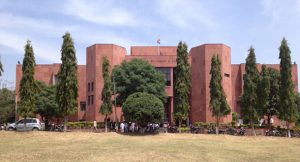
December-07-2022-( JNF):- In a Public Intrest Litigation seeking directions to restrain the government as well as general public from mentioning or referring persons with disabilities or specially able persons as “mentally retarded, sick, unfortunate, handicapped person, abnormal, mental, poor, unfortunate person, crippled, deformed , mad person, dwarf, wheelchair bound, dwarf, albino, disabled, mongoloid, midget, deaf and dumb, troubled person in official internal and external communications, judicial orders, notifications, circulars, newspapers, textbooks and Court orders.” It also seeks to amend suitably the laws using the words mentally retarded in the Multiplicity Disability Act, 1999, besides some other laws on the subject, A Division Bench of Jammu & Kashmir and Ladakh High Court comprising Chief Justice Ali Mohammad Magrey and Justice Rahul Bharti, issued notice to the respondents and directed respondents to ensure expeditious recognition of the claim of the petitioner for the specially abled persons.
The PIL filed by a practising lawyer of the Jammu and Kashmir High Court seeking the following reliefs, issue writ of Mandamus or any other appropriate writ and the respondents along with general public be restrained from mentioning or referring persons with disabilities or specially able persons as mentally retarded, sick, unfortunate, handicapped person, abnormal, mental, poor, unfortunate person, crippled, deformed , mad person, dwarf, wheelchair bound, dwarf, albino, disabled, mongoloid, midget, deaf and dumb, troubled person in official internal and external communications, judicial orders, notifications, circulars, newspapers, textbooks, Court orders, also issue appropriate writ for declaring words such as mentally retarded used in Section 2(g) of The National trust for welfare ofpersons with autism, cerebral palsy, mental retardation and multiple disabilities act 1999 as violative of Article 14, 15 and article 21 of Indian Constitution and also seeking direction to the respondents to establish and implement disability accessible infrastructure across Trial Court and Principal District and Sessions Judge Courts of each district in Jammu, Kashmir and Ladakh. Issue Writ of Mandamus, for declaring words such as mentally retarded, sick, unfortunate, handicapped person, abnormal, mental, poor, unfortunate person, crippled, deformed ; mad person, dwarf, wheelchair bound, dwarf, albino, disabled, mongoloid, midget deaf and dumb, troubled person used to name or refer persons with disability as undignified and violative of Article 14,15 and article 21 of Indian Constitution.
DB while hearing PIL observed that the concern of the petitioner is that the respondents who use the language guidelines already introduced universally as prescribed and the list of words and their alternate words enumerated, mentioned, illustrated so that internal and external communications must be respectful physically as well as mentally. It is submitted that across the world respectful language, disability communication,disability etiquette have been prescribed, mentioned and used during communications, pleadings, Judicial orders, academic writings, official work, educational textbooks, pamphlets, across Public and Private offices.
Petitioner, as stated, has approached all the respondents for ensuring adherence to the inclusion strategy launched at international level for having reference to language guidelines so introduced in the terminology used in the office/Courts etc. The petitioner is also seeking discontinuation of such words while referring to persons with disability or specially abled persons, which will otherwise not affect the functioning, scope, nature, operation and enforcement of Disability Act as the same words are not mentioned in Disability Act. It is submitted that the petitioner has also sought direction for suitably amending the laws, using the words mentally retarded in the Multiplicity Disability Act, 1999, as also some other laws on the subject.
DB on consideration of the matter, is of the view that the issue raised needs to be addressed by the respondents, so as to value the universal conventions and the sentiments of these specially abled persons for giving them full support humanly and socially. The petitioner has also highlighted the difficulties faced with the specially abled persons while approaching the different offices/courts in the UT of J&K and UT of Ladakh. He makes reference that it is very difficult to pursue the cases in the offices/Courts while having no facility of even constructed ramps, lifts, providing Wheel Chairs along with Hand raised and special washroom facilities also.
DB issued notice to Union of India and UT and directed all the respondents to ensure expeditious recognition of the claim of the petitioner for the specially abled persons. We also hope and trust that the society as a whole shall recognize their rights as guaranteed under the Constitution. The specially able persons be treated properly by the language recognized internationally. We also direct the respondents to ensure that the facilities as identified hereinabove are provided/developed, if not, already existing.
During the course of hearing counsel made a request for asking the respondents to ensure that in the event any of specially abled person become victim of some commission of offence(s), it shall be ensured that the Police records their statements by approaching at their place of convenience/residence so as to avoid bringing them to the Police Station.
DB hope and trust that the respondents will take effective and meaningful steps for ensuring the recording of the statements of any specially abled persons, in the eventuality DBhave detailed out above, at their place of convenience/residence. DB expect that the respondents shall ensure full respect and honour to all citizens in terms of their personality without letting them suffer any impression that the society and State sees and address the physically and mentally challenged persons as liabilities carrying personalities and, as such, sensitivity has to be in full operation. JNF